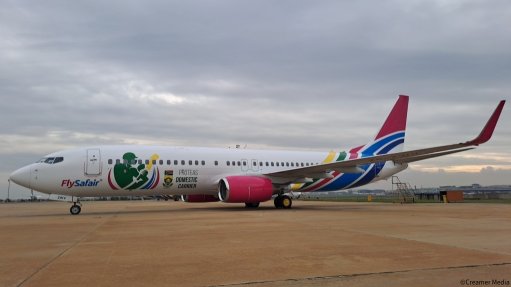Professor calls for support to grow marine geosciences to understand oceans
Prior to the United Nations World Oceans Day on June 8, University of KwaZulu-Natal (UKZN) Professor of Marine Geology and University of Ulster in Northern Ireland visiting Professor Andrew Green has called for more support to grow the field of marine geosciences in South Africa.
Ocean environments are slowly becoming degraded, with 90% of big fish populations depleted, and 50% of coral reefs destroyed.
"We are taking more from the ocean than can be replenished. As the challenges to the oceans continue to grow, so does the need to understand them and to mobilise globally for the sustainable management of the world's oceans."
The South African deep sea is still greatly under-researched, with insufficient information to grow the ocean economy and underpin sound environmental management, said scientific research network the National Science and Technology Forum (NSTF).
There is a great need for knowledge and capacity building and creating funding in South Africa for deep-sea research, together with government and international organisations, to better understand the biodiversity, ecosystems and vulnerabilities, and improve offshore and deep-sea management and conservation, it says.
"Economic growth is spurring the blue economy owing to opportunities for the diversification of South Africa's offshore activities, such as seabed mining, fisheries and deep-sea oil and gas sequestration."
The boom in seabed mining has allowed for the burgeoning of marine geology in South Africa, which is a typically small field here still.
"South Africa is slowly playing catch-up when it comes to coastal geological mapping and the management of marine natural resources and mineral wealth, and the necessary infrastructure is needed to move us forward," the NSTF says.
The Marine Geoscience Programme of the Council for Geoscience aims to create the real map of the ocean floor around South Africa, seamlessly spanning the onshore area to the outermost edge of South Africa’s offshore territory, it highlights.
This is in accordance with Operation Phakisa, which is a governmental initiative put in place to fast-track the objectives of the National Development Plan.
The programme will provide full coverage of the country’s exclusive economic zone, using various vessels designed for a range of ocean depths and applying five marine geophysical methods.
The research of this programme is enriched by relying on a strong global network, adhering to global standards in marine geophysics and hydrography, to ensure that living and mineral resources are used sustainably.
This research should ensure that South Africa is on the right track in terms of achieving the international objectives outlined in the UN 2030 Sustainable Development Goals and the 2063 agenda of the African Union.
Meanwhile, the NSTF awarded Green with the prestigious award for excellence in marine geoscience research, which forms the key to unlocking the blue economies of the world’s oceans and protecting our coastlines from the effects of climate change.
Green is dedicated to protecting our coastlines from the impacts of climate change. His work involves a holistic approach to examining coastal and shelf geomorphology and sedimentology in response to induced sea level change, the NSTF adds.
"His groundbreaking research changed understanding about how sea level rise affects sand dunes and barrier islands. This research has become the underpinning of global policy, in terms of establishing whether or not you withdraw from rising sea levels or whether you defend against them.
"Green’s research involves collaboration with diverse groups of students, giving access to complex and expensive geophysical equipment and software, imparting knowledge, and researching a comparatively poorly studied field," the research network says.
Marine geology rose to prominence in South Africa when Green put out a paper about the correlation between storminess in the south-west Indian Ocean and increasing ocean surface temperatures, the findings of which were incorporated into cooperative governance planning at the local and provincial levels.
“This opened a dialogue with a range of local and national governmental agencies, agencies further afield in Mozambique and in Tanzania, and even beyond Africa. I am greatly pleased about having helped aid in the growth of this field on home soil,” he said.
The ocean covers over 70% of the planet. It is its life source, giving sustenance to every organism on earth, provides 50% of the earth’s oxygen and is a major source of food and medicine. It is a critical part of the biosphere.
The aim of the UN World Oceans Day is to celebrate the role of the oceans in everyday life and inspire action to protect the ocean and sustainably use marine resources.
Initiatives such as the Horizon 2020 Atlantic and Mission Atlantic Projects and the Challenger 150 initiative have made significant impact in supporting local capacity development in line with the UN Decade Plan: Ocean Science for Sustainable Development.
Article Enquiry
Email Article
Save Article
Feedback
To advertise email advertising@creamermedia.co.za or click here
Comments
Press Office
Announcements
What's On
Subscribe to improve your user experience...
Option 1 (equivalent of R125 a month):
Receive a weekly copy of Creamer Media's Engineering News & Mining Weekly magazine
(print copy for those in South Africa and e-magazine for those outside of South Africa)
Receive daily email newsletters
Access to full search results
Access archive of magazine back copies
Access to Projects in Progress
Access to ONE Research Report of your choice in PDF format
Option 2 (equivalent of R375 a month):
All benefits from Option 1
PLUS
Access to Creamer Media's Research Channel Africa for ALL Research Reports, in PDF format, on various industrial and mining sectors
including Electricity; Water; Energy Transition; Hydrogen; Roads, Rail and Ports; Coal; Gold; Platinum; Battery Metals; etc.
Already a subscriber?
Forgotten your password?
Receive weekly copy of Creamer Media's Engineering News & Mining Weekly magazine (print copy for those in South Africa and e-magazine for those outside of South Africa)
➕
Recieve daily email newsletters
➕
Access to full search results
➕
Access archive of magazine back copies
➕
Access to Projects in Progress
➕
Access to ONE Research Report of your choice in PDF format
RESEARCH CHANNEL AFRICA
R4500 (equivalent of R375 a month)
SUBSCRIBEAll benefits from Option 1
➕
Access to Creamer Media's Research Channel Africa for ALL Research Reports on various industrial and mining sectors, in PDF format, including on:
Electricity
➕
Water
➕
Energy Transition
➕
Hydrogen
➕
Roads, Rail and Ports
➕
Coal
➕
Gold
➕
Platinum
➕
Battery Metals
➕
etc.
Receive all benefits from Option 1 or Option 2 delivered to numerous people at your company
➕
Multiple User names and Passwords for simultaneous log-ins
➕
Intranet integration access to all in your organisation


















